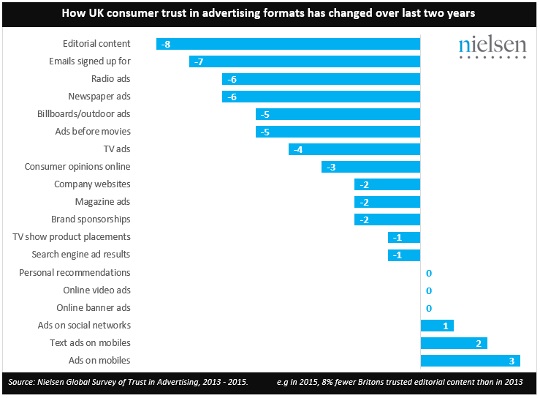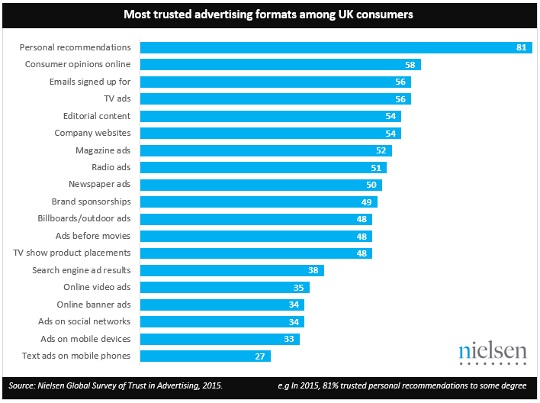Most forms of advertising and communication, such as TV ads, company websites, and promotional emails, have all seen a decline in trust among UK consumers over the last two years, according to new research.
The study, from Nielsen’s latest biennial Global Survey of Trust in Advertising, polled 30,000 online respondents in 60 countries.
In the UK, the format hit by the biggest decline in trust was editorial content (down 8% points to 54%) followed by emails that consumers sign up for (down 7% to 56%) and newspaper and radio ads (both down 6%).

Change in trust of ad formats
Of the 19 ad formats covered in the report, only the three least trusted – mobile ads, text ads on mobiles and ads on social networks – have increased in trust over the last two years. Thirteen experienced a decline, while three were unchanged.
So, what can brands do?
“There isn’t one simple rule for maximizing advertising effectiveness in a saturated market like the UK, but understanding how consumers feel about the ads they’re served on various media platforms is a good starting point,” explains Nielsen’s EVP of marketing effectiveness for Europe, Terrie Brennan.
“While advertisers have started to follow consumers online, about a third of online advertising campaigns don’t work – they don’t generate awareness or drive any lift in purchase intent. More than ever, consumers are in control of how they consume content and interact with brands, so understanding ad resonance across screens is now the only way to successfully drive memorability and brand lift.”
Personal recommendations most influential
Personal recommendation (trusted to some degree by 81% of UK respondents) remains the most trusted form of advertising or communication, with the credibility gap widening between it and other formats. It now stands alone as the only format trusted by more than 60% of UK respondents – an accolade shared by some five formats just two years ago.
‘Consumer opinions online’ (58%) is now the second most trusted format (up from fourth two years ago) and is followed by ‘emails signed up for’ and TV ads (both 56%).

Most trusted ad formats
Online video ads and online banner ads have a lower trust rating than traditional ad formats, but their credibility has held up over the last two years, while trust in TV ads has fallen.
Brennan again: “Brands have generally increased their digital ad spend as they’ve become more comfortable with digital advertising and measurement, but TV formats still deliver the highest unduplicated reach (ie, the ad reaches each audience member only once) of 85-90%.
Digital ads can offer considerable benefits – such as precision-focused campaigns, in-flight adjustments and more creative options – but moving from TV to an all-display digital plan is a bold move for any marketer. A mix of both offline and online channels usually offers the best ROI.”
Nielsen’s Global Trust in Advertising survey reveals that Britons are generally less trusting of all types of advertising compared to the global average, but generally more trusting than Europeans as a whole.
Ad formats most conducive to taking action
Personal recommendation is the format most likely to lead to some form of action being taken by consumers (cited by 71% of respondents), followed by opted-in emails (62%) and TV ads (53%).
Generally, people are more likely to trust an ad format than take action as a result of seeing it. However, three ad formats buck this trend. Opted-in emails are more likely to engender action than trust (62% take action vs. 56% trust), as are ads in search engine results (43% vs 38%) and mobile text ads (28% vs. 27%).
“The formats where action exceeds trust by the greatest margin share a common attribute: easy access to the product or service,” says Brennan. “You like it, you buy it. Online and mobile formats make it exceptionally easy for consumers to live in the moment and take quick action on the ad. Often, consumers simply click a link and they’re directed to a place where they can receive more information or purchase the item.”
